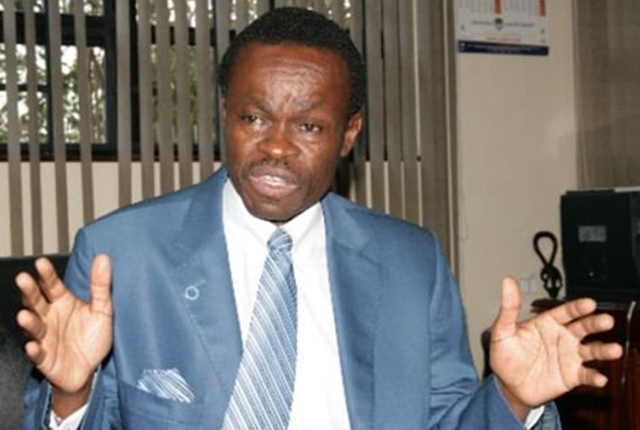Wake-up call to Zimbabwe’s institutions of higher learning

David Mungoshi Shelling The Nuts
From each according to their expertise and to each according to their needs may sound like leftist rhetoric, but it is in fact, an apt maxim in the context of Zimbabwe’s higher education institutions.We may take the institutions in question to be the teachers’ colleges, the polytechnics, vocational training institutions and our revered universities. Each of these has or should have a vision and a mission statement as well as expected learning outcomes, and all these should dovetail into national goals and programmes both incumbent and projected. But above all these institutions should be innovators rather than just implementers.
Addressing a session of the 8th Pan -African Congress in Accra in August 2015, Professor Otieno Patrice Emile Lumumba of Kenya made a very telling observation about Africa and her engineers.
He asked the pertinent question about all the roads being built around the continent and about who was building them. The answer to his question was devastatingly disconcerting. Chinese technicians were building these beautiful roads, not the engineers!
We seem to have laid to sleep that spirit of adventure and enterprise that available records show as having led to black civilisations expanding to other continents including the Americas.
It is a misnomer to suggest that Christopher Columbus discovered America when he himself is said to have recorded in his log book that others had preceded him there by hundreds of years.
Prof Lumumba’s observation is easily transferable across the disciplines. We can ask the same question of everyone in whatever field they work. What have you done lately to make the world turn its head and look? What have you done to cause disequilibrium or what psychologists call cognitive dissonance?
People need to be shaken a little and disturbed just enough to make them want to take another look at themselves and the lives they lead. Out of that introspection may come some good.
A classic advertising technique takes its cue from the encounter between Satan and Eve in the Garden of Eden as portrayed by John Milton in his epic poem “Paradise Lost”. The first thing to do in any innovation is to get the attention of the intended target.
So Satan praises Eve for her devastating beauty. The next thing is to make the person feel discontented and inadequate by telling them what they might become under certain circumstances.
Satan tells Eve that if the partaking of a certain fruit in the garden can give the power of speech to a serpent like him, what wonders might it do for her. Eve is disturbed and afraid but, nevertheless, interested.
In the third phase you extol the virtues of the product by painting a picture of beauty, power and wonder. This makes the product seem desirable and essential. Satan tells Eve she will become a goddess if she eats fruit from the tree of knowledge. Overwhelmed by her curiosity and need Eve eats.
When an advert is successful the end result is a sale/sales!
Soon after independence in 1980 when the world converged on Zimbabwe there were expatriate teachers everywhere. I was on the staff of a small secondary school in an obscure mining town together with teachers from England, Denmark and South Africa.
Of the two Danish gentlemen teachers one was a Metalwork and Carpentry teacher. One day he sat in to watch the Metalwork teacher work with his Form 1 class. The man was so intimidated that throughout his four-year stay at the school he never again set foot in the metal work workshop.
He told the headmaster that he would rather do carpentry because what he had seen of metal work in the Form 1 class was only taught at Form 4 level in Denmark. He must have been right because one of the boys from this class after having done two years of Metalwork went to read for a degree in Civil Engineering and had the surprise of his life.
He was later to tell me that if he had continued with Metalwork and Technical Drawing beyond Form 2 he would have walked the degree. That mighty assertion was based on what he had learned in the first two years of secondary school!
By our standards we seem to have gone into a slumber, one that we must now wake from as a matter of urgency. To benefit from such an awakening each cog in the higher education system of Zimbabwe must play its part and do so convincingly. Let us start with the teachers’ colleges.
A group of 200 college students on teaching practice out in the schools was recently quizzed about the new curriculum that is being talked about. It emerged that these students were quite at sea regarding what the new curriculum is and only three of them said the school they were at was involved in the teaching of the new curriculum.
None of the student teachers reported seeing the Curriculum Framework. It seems also that the teachers’ colleges are still to have sight of this very important document. What that tells us is that we may have put the cart before the horse and must retrace our steps somewhat.
In the olden days, Dadaya Mission in the outskirts of Zvishavane town trained teachers and became famous and respected for its pedagogy and products. A teacher from there by the name of Sydney Keyi won what was probably the equivalent of today’s Secretary’s Bell.
It was a pleasure just to know him. Teachers like him were artists rather than mere functionaries. Given that the teachers colleges are largely autonomous it is incumbent upon them to design and implement programmes that can give trainees enough knowledge and adequate skills to promote the new curriculum.
The good news is that these things can be done. Over the years we have seen colleges introduce many new things; theory of music, art education, the new Mathematics, discovery learning and so on.
The polytechnics can become centres of technical and other innovations. A paradigm shift is probably necessary with such entities becoming real centres of innovation and invention. What happened to the jatropha-run engine vehicle at Harare’s Polytechnic?
There could have been a Memorandum of Understanding (MOU) between this polytechnic and say a college of agriculture where the latter would grow the jatropha and the former would consume. Allowing that hard cash is a major scarcity, these institutions could user barter trade as a currency and voila, an industry would grow!
Graduates from the country’s Vocational Training Centres fit into the amazing mould of technicians who do wonderful work as described by Professor Lumumba with regard to Chinese technicians. The tragedy is that only those who see them in action know just how good they are across the board: fitting and turning, boiler-making, joinery and brickwork and so on. Isn’t it time for some cross-fertilisation across the institutions?
To an extent, the universities may be trapped in their own erudition and, therefore, find it difficult to shake off the tag of ivory towers that clings to them. New imperatives and pedagogies that blur the boundaries between disciplines are emerging all the time.
To succeed with any new thrust in the universities, it will be necessary to revisit teaching philosophies as pedagogical tools and to think outside the box.
Literature has become increasingly more relevant across the disciplines, especially as a tool for grounding students in empathy and compassion and for the teaching and illustration of non-violent language.
In spite of expected objections from the legal community, for example, legal thrillers are being used more and more to teach law. Law faculties can, therefore, profitably establish links with, say the English Department and so on, to create new courses where students create legal thrillers and thus start a new product for the country’s book chain.
Speculative Literature and Sci-Fi are a now-idea around the world, but none of our universities seem to take the two seriously. More is the pity given their industrial potential. I once taught Communication Skills to a Mechanical Engineering student whose dream was to invent a flying car. Nothing came of it. People must have thought him mad. But according to George Bernard Shaw, the world owes a lot to the unreasonable man!
Veterinary science faculties and colleges of health sciences can benefit from courses in poetry. Such courses can help students come to terms with such things as pain, suffering and death on almost a daily basis as well as how to break bad news in a way that avoids trauma for all.
It is time to ditch the business as usual paradigm and become leaders in research, innovation growth and development. Material benefits will ensue thereafter.
David Mungoshi is an applied linguist, a qualified primary and secondary schoolteacher. He has vast experience in teacher education and has taught at university and is also an award-winning novelist and a published poet.










Comments